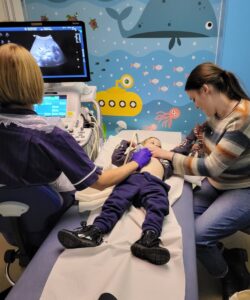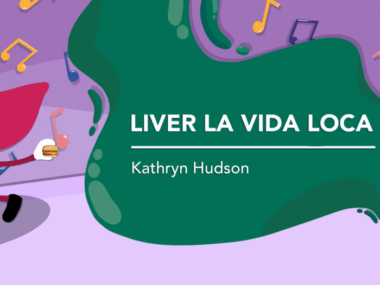Creating memories during our daughter’s annual trip to a specialist
Amid exams for PFIC, our 3-year-old is starting preschool
Written by |

It’s been a special week in our household as our daughter, Eva, started preschool. We were brimming with pride as she held her new teacher’s hand and walked in with a big, yet slightly tentative smile. Her teachers described her as “thriving,” which is what any parent wants to hear — especially when their child has a progressive liver disease.
Eva has progressive familial intrahepatic cholestasis (PFIC), an umbrella term that includes rare, genetic disorders that cause severe liver disease.
Also this week, we received the results from Eva’s annual trip to Birmingham Children’s Hospital here in the U.K. Many families travel long distances to get to the hospital, which has a specialist liver unit, so we can’t complain about our three-hour round trip. Plus, our local hospital, where most of Eva’s appointments are, is only a five-minute walk from our house.
A brave patient
In Birmingham, Eva has a full range of scans, blood tests, and examinations. Over the years, with support from Grandma Annie, we’ve developed a routine for these long days, although they never get any easier!
We made our first trip there when Eva was a baby. She loved looking out of the train window, spotting cows and sheep in the English countryside. She had to fast before having the scans, and the journey grew increasingly difficult as she got hungrier. Her little hands would fight to get into my top for milk, and her tiny face expressed confusion about why I wouldn’t let her drink. It felt like such a cruel necessity.
We sat in a table seat with three other women who all happened to have grandchildren of their own. They each took turns playing, reading, and singing with Eva to keep her distracted. I’ll never forget the kindness of those strangers.
On our latest trip to the hospital, the entire train heard, “Mum, Mum, Mum, Dad, Dad, Dad, can I have a snack?” for the entire journey. Luckily, she can now have clear juices, which provided a good distraction — and probably a bit too much sugar.
Eva’s always tolerated her scans. During the first ultrasound scan she had as a baby, the sonographer looked at me as if I were an alien when I said we’d rather sing nursery rhymes than watch TV. By the end of it, the whole room was singing all of the classic rhymes together, which made for quite a jolly affair!
During our latest trip, the doctor suggested that Eva should have her first fibroscan. The medical team anticipated that she wouldn’t be able to tolerate it because of the pulses it creates and because it required her to sit very still. At 3 years old, Eva was the youngest patient the hospital had successfully scanned. She often feels older than her years, and this scan was no exception.
Blood tests, however, have been a different story. She is understandably frightened of them. At times, it’s taken three of us to restrain her — another cruel necessity. Over the years, we’ve tried different numbing creams and sprays. I’ve taken her along to my own blood tests. We’ve tried lots of playing nurse at home, but nothing has made much of a difference.
Finding the positives
To brighten up these days, we try to do something nice as a family. The National Sea Life Centre isn’t too far from the hospital and provides a welcome distraction from fasting. We also let Eva choose anything she wants from the hospital shop. So far, we’ve gotten away without spending too much money, as she normally opts for bubbles and footballs. I have a feeling this won’t last forever.
As for Eva’s test results, the damage to her liver is increasing — unsurprisingly, as her disease is progressive. We’ve been advised to encourage her to eat more, which is difficult for a girl who’s often known to have three portions of lunch during preschool. For now, though, she still lives what we consider a normal life, and for that we are so very lucky.
Note: Liver Disease News is strictly a news and information website about the disease. It does not provide medical advice, diagnosis, or treatment. This content is not intended to be a substitute for professional medical advice, diagnosis, or treatment. Always seek the advice of your physician or other qualified health provider with any questions you may have regarding a medical condition. Never disregard professional medical advice or delay in seeking it because of something you have read on this website. The opinions expressed in this column are not those of Liver Disease News or its parent company, Bionews, and are intended to spark discussion about issues pertaining to liver disease.






Leave a comment
Fill in the required fields to post. Your email address will not be published.